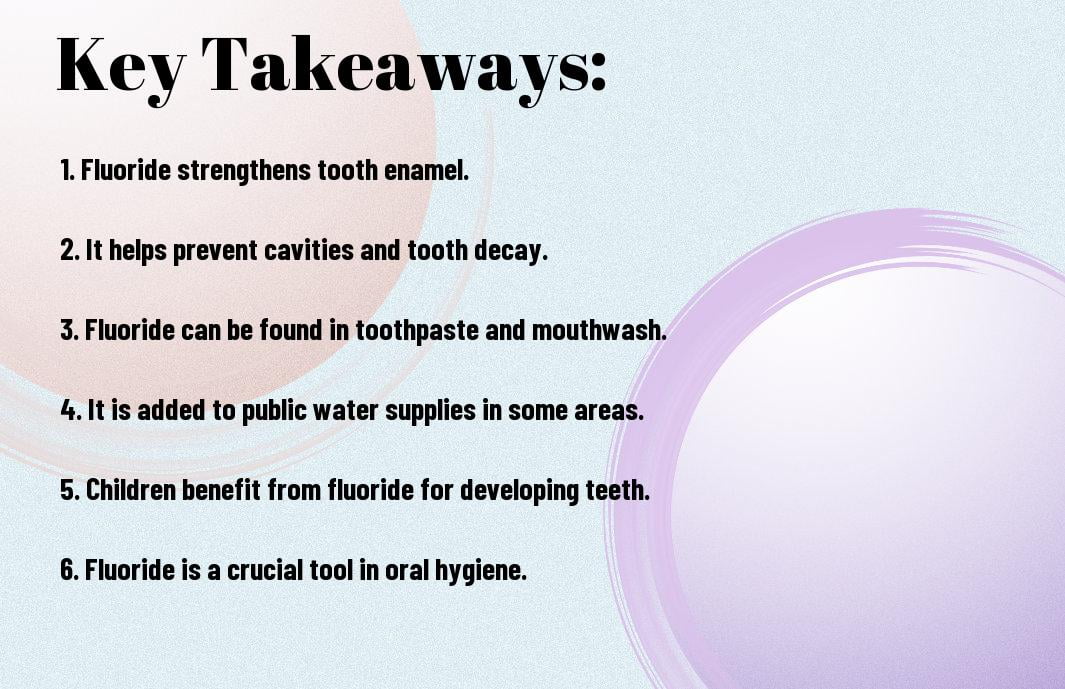Did you know that fluoride plays a crucial role in preventing tooth decay? It is a naturally occurring mineral that can be found in water, soil, and various foods. When it comes to your dental health, having fluoride in your toothpaste, water, and mouthwash can significantly reduce your risk of developing cavities and decay. By strengthening your tooth enamel, fluoride makes it more resistant to acid attacks from plaque bacteria in your mouth. This means that you are less likely to experience tooth decay and will have a lower chance of needing fillings, root canals, or extractions. Ensuring that you have an adequate intake of fluoride is an essential part of maintaining good oral hygiene and preventing dental problems.
Key Takeaways:
- Fluoride is essential for preventing tooth decay: Fluoride helps to strengthen tooth enamel and make teeth more resistant to acid attacks from plaque bacteria and sugar in the mouth, reducing the risk of cavities and decay.
- Fluoride can be obtained from multiple sources: In addition to toothpaste and mouthwash, fluoride can be found in drinking water, certain foods, and professional fluoride treatments at the dentist’s office, ensuring a consistent supply for dental health.
- Regular exposure to fluoride is crucial for maintaining oral health: Incorporating fluoride into a regular oral hygiene routine, including brushing with fluoridated toothpaste and drinking fluoridated water, is crucial for protecting teeth and preventing decay in both children and adults.
The Science of Fluoride
Any discussion about the importance of fluoride in preventing tooth decay starts with understanding the science behind it. Fluoride is a naturally occurring mineral found in water sources, soil, and various foods. It is also commonly added to toothpaste, mouthwash, and community water supplies as a preventive measure against tooth decay. The science of fluoride involves its chemical properties and mechanisms of action in strengthening tooth enamel and preventing cavities.
Chemical Properties of Fluoride
Fluoride is unique in its ability to strengthen tooth enamel and prevent acid erosion. When you consume fluoride, it becomes integrated into the structure of your teeth, making them more resistant to acid attacks from bacteria and sugars. This mineral also promotes remineralization, the process of depositing minerals such as calcium and phosphate back into the enamel, helping to reverse early stages of tooth decay. The protective shield that fluoride provides helps to keep your teeth strong and healthy, reducing the risk of cavities and decay.
Mechanisms of Action in Enamel Strengthening
When fluoride is applied to your teeth, it interacts with the enamel to form a stronger, more acid-resistant surface. This process, known as fluorapatite formation, replaces the more soluble hydroxyapatite in the enamel, making it less susceptible to demineralization. Additionally, fluoride disrupts the metabolism of bacteria in dental plaque, reducing their ability to produce acid that damages the teeth. By strengthening the enamel and inhibiting acid production, fluoride plays a crucial role in preventing tooth decay and maintaining your oral health.
The Use of Fluoride in Dental Care
After years of research and practical application, fluoride has been found to be crucial in maintaining good oral health. The use of fluoride in dental care has been proven to prevent and even reverse the early stages of tooth decay. There are several ways that you can benefit from the use of fluoride, and this chapter will explore some of the most common applications in dental care.
Fluoride in Toothpaste
When it comes to your daily dental care routine, using toothpaste that contains fluoride is highly recommended. Fluoride in toothpaste helps to protect your teeth from cavities by strengthening the enamel. By brushing your teeth with fluoride toothpaste at least twice a day, you can significantly reduce the risk of tooth decay and maintain a healthy smile for years to come.
Community Water Fluoridation
Community water fluoridation is a public health measure that involves adjusting the fluoride content of a community’s water supply to an optimal level for dental health. This cost-effective intervention has been shown to significantly reduce the prevalence of cavities in both children and adults. By simply consuming fluoridated water, you can help protect your teeth and prevent tooth decay without any additional effort.
Debates and Misconceptions about Fluoride
Despite the overwhelming evidence supporting the benefits of fluoride in preventing tooth decay, there are still debates and misconceptions surrounding its use. Some individuals and groups question the safety and effectiveness of fluoride, leading to confusion and uncertainty about its role in dental care.
Safety Concerns and Myths
One of the most common misconceptions about fluoride is the belief that it is harmful to your health. There have been claims that fluoride can lead to various health issues, including cancer and neurological disorders. However, numerous scientific studies and rigorous research have repeatedly demonstrated the safety of fluoride when used in recommended levels. The American Dental Association (ADA) and the World Health Organization (WHO) both recognize the benefits of fluoride and affirm its safety for use in preventing tooth decay. It’s essential to trust the expertise of dental and public health professionals who advocate for the use of fluoride to maintain good oral health.
Addressing Common Misconceptions
Another misconception about fluoride is that it is unnecessary, especially with the availability of fluoride-free oral care products. However, the truth is that while these products can help, they may not provide adequate protection against tooth decay, especially for those at higher risk. Fluoride has the unique ability to strengthen tooth enamel and prevent cavities by inhibiting the growth of harmful bacteria in the mouth. So, while using fluoride-free products may offer some benefits, they cannot replace the effectiveness of fluoride in preventing tooth decay.
Practical Tips for Effective Fluoride Use
To maximize the benefits of fluoride in preventing tooth decay, here are some practical tips for effective fluoride use:
- Brush your teeth twice a day with a fluoride toothpaste.
- Use fluoridated mouthwash to rinse your mouth after brushing.
- Drink fluoridated water to aid in the prevention of cavities.
- Limit your consumption of sugary and acidic foods and beverages.
- Consider professional fluoride treatments from your dentist for additional protection.
Recognizing the importance of The Role of Fluoride in the Prevention of Tooth Decay and following these tips can greatly improve your oral health.
Daily Oral Hygiene Recommendations
It is essential to maintain a good oral hygiene routine to complement the benefits of fluoride. You should brush your teeth at least twice a day, floss regularly, and use a fluoride mouthwash to thoroughly cleanse your mouth. Additionally, it is important to visit your dentist for regular check-ups and cleanings to ensure that your teeth and gums are healthy.
Professional Fluoride Treatments and Supplements
Your dentist may recommend professional fluoride treatments to provide additional protection against tooth decay, especially if you are at a higher risk. These treatments can include the application of fluoride gels, varnishes, or foams directly to your teeth to strengthen the enamel. In some cases, your dentist may also recommend fluoride supplements in the form of tablets or drops to support your oral health.
The Importance Of Fluoride And Its Role In Preventing Tooth Decay
Upon reflecting on the information presented, it is clear that fluoride plays a crucial role in preventing tooth decay and maintaining overall oral health. By strengthening tooth enamel and inhibiting the growth of harmful bacteria, fluoride helps to protect your teeth from the damaging effects of acid and plaque. Incorporating fluoride into your dental care routine, whether through fluoridated water, toothpaste, or professional treatments, is essential for preserving the health and longevity of your teeth. It is important to prioritize the use of fluoride in order to reduce the risk of tooth decay and maintain a healthy smile for years to come.
FAQ
Q: What is fluoride and why is it important for preventing tooth decay?
A: Fluoride is a naturally occurring mineral that helps to prevent tooth decay by making the teeth more resistant to acid attacks from plaque bacteria and sugars in the mouth.
Q: How does fluoride work to prevent tooth decay?
A: Fluoride works in two ways: before teeth erupt, fluoride strengthens tooth enamel; after teeth erupt, fluoride remineralizes the enamel, making it more resistant to decay.
Q: What are the main sources of fluoride for dental health?
A: Fluoride can be found in toothpaste, mouth rinses, and professional fluoride treatments at the dentist’s office. It is also naturally present in some water sources and can be added to public water supplies in a process called water fluoridation.
Q: Is fluoride safe for use in preventing tooth decay?
A: When used in recommended amounts, fluoride is safe and effective for preventing tooth decay. However, excessive fluoride intake can lead to dental fluorosis, a cosmetic condition that affects the appearance of tooth enamel. It is important to follow the instructions of dental professionals when using fluoride products.
Q: How can I ensure that I am getting enough fluoride for dental health?
A: To ensure you are getting enough fluoride for dental health, use a fluoride toothpaste, drink fluoridated water, and consider fluoride treatments at your dentist’s office if you are at a higher risk for tooth decay. It is also important to maintain a good oral hygiene routine and visit your dentist regularly for check-ups and cleanings.







